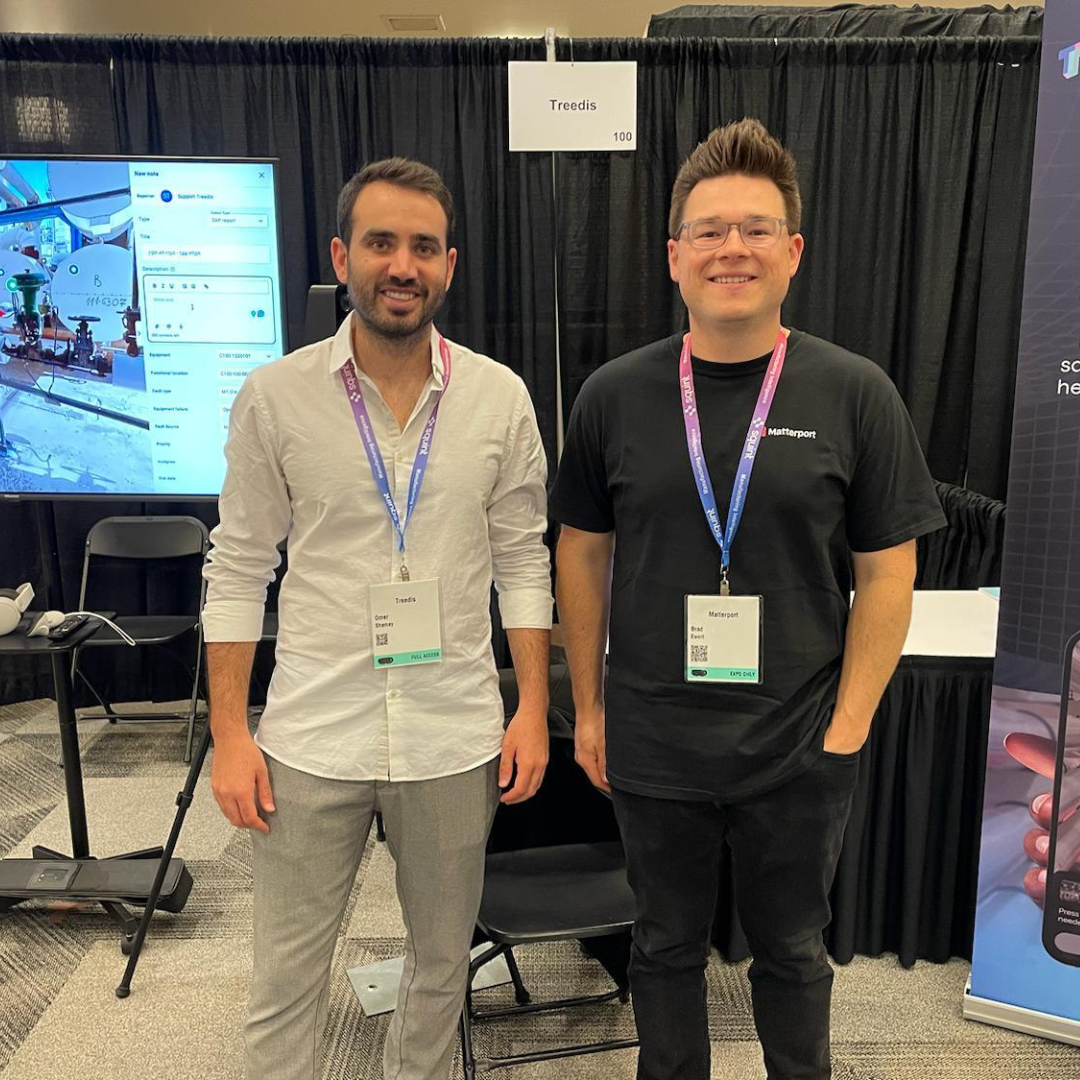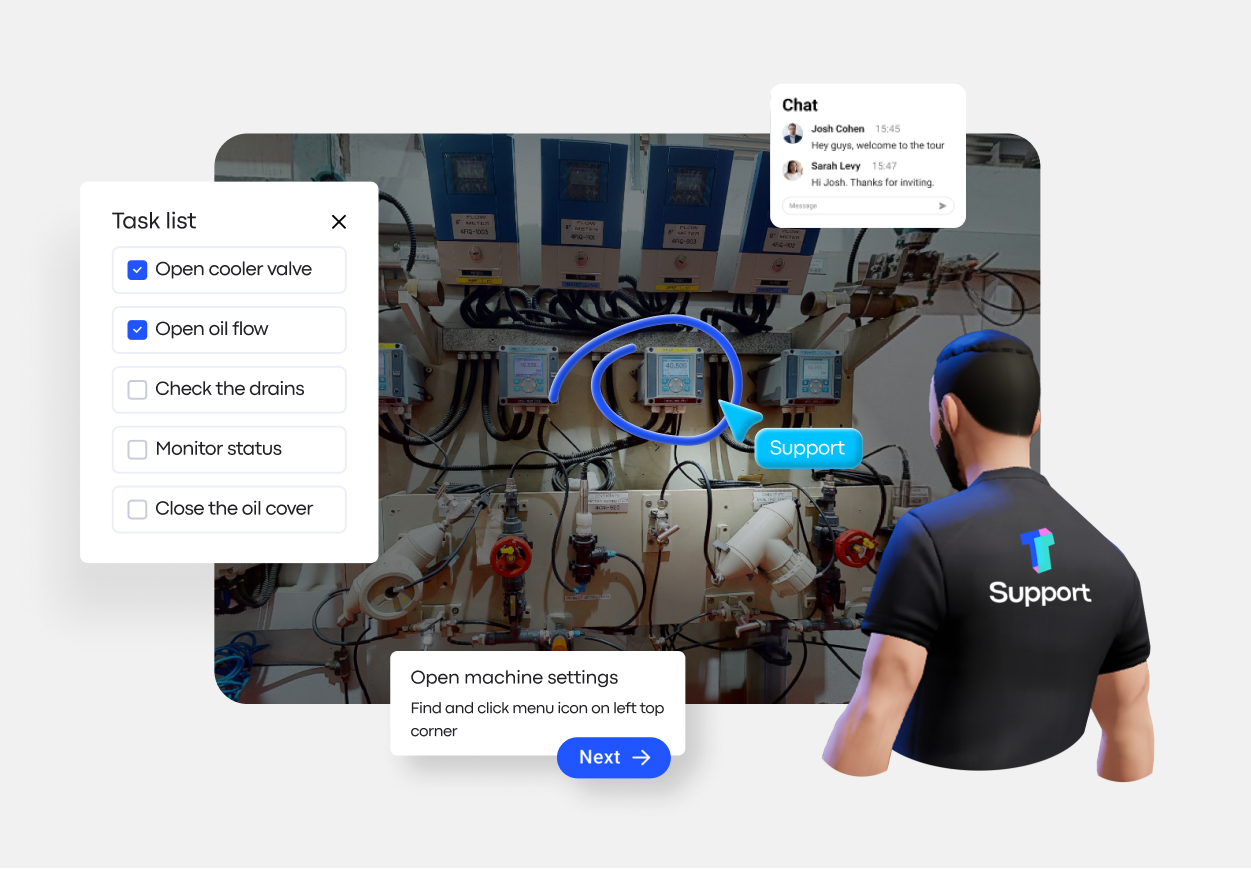January 14, 2025
Blog
Key Insights from Hannover Messe: The Future of Manufacturing in Industry 4.0
%20(1).jpg)


Treedis was honoured to participate in the 2024 Hannover Messe event in Hannover, Germany for the second consecutive year, in collaboration with our partners Amazone Web Services (AWS), Vodafone Business, and Matterport. Treedis was hosted at the Vodafone booth, providing an excellent platform to demonstrate how Treedis' Connected Workers solution can revolutionize manufacturing. This showcase highlighted the significant advantages our strategic partnerships offer, enhancing our ability to deliver innovative solutions through these collaborations.

Showcasing Innovative Digital Twin Integration
The primary objective of our participation in the event was to showcase our collaborative initiative undertaken with AWS, Vodafone Business, and Matterport at the Vodafone Edge Innovation Lab.
This project seamlessly integrated a Matterport-captured digital twin with the AWS IoT Twinmaker, enriching it with live data pulled from ifm sensors. Treedis further enhanced this digital twin through our Connected Workers solution, which empowers frontline workers to access critical information, workflows, and data in real time through virtual and augmented reality. Additionally, workers have the capability to leave notes in the field that are instantly accessible from desktops, significantly improving supervisors' response times and offering a more thorough insight into operational challenges. This functionality, coupled with Vodafone’s robust 5G network, ensures continuous connectivity, a vital component for the efficiency and effectiveness of frontline operations.
Chris Dyer, the portfolio lead at Vodafone Business Edge Compute, and Pallavi Chari, WW GTM Lead - Industrial IoT Applications and Digital Twins at AWS shed more light on the project in their joint presentation at Hannover Messe.
Their presentation emphasised the importance of combining strategic partnerships and technologies to achieve business values in preparing for the Next-Gen Plant. This combination comes from the need for manufacturing customers to have agile operations to survive and the ability to bring things together to scale in ways that eliminate data silos.
“This requires a holistic view across applications,” explained Pallavi.
Thus the goal of the collaborative project was to create an end-to-end showcase that has a unified architecture, which involved connecting brownfield equipment telemetry and anomaly detection in ways that made the data easy to share and understand.
“It was important to contextualise a knowledge graph in an immersive way that feels right to the end user,” said Pallavi.
“We are taking that physical 3D scan of our lab and the assets [within it] and then looking at how we can share that in the AWS Grafana dashboard, but also then taking it to the next level [by making it] more immersive. So, working with Treedis, we then extended the same level of information into a virtual reality application. We’re taking all of these ideas into real-world scenarios for our customers,” explained Chris.

Real-world scenarios
These real-world scenarios are especially evident in the manufacturing industry, where connecting workers to the people, processes, and technologies around them has become increasingly critical to minimise unplanned downtime and enhance onboarding and knowledge transfer. For the frontline worker, having direct access to these systems is crucial.
This need to embrace Industry 4.0 to drive business value is fast being realised in the manufacturing industry .
The global Industry 4.0 market is projected to expand significantly, reaching USD 627.59 billion by 2030 with a CAGR of 19.9% from 2023 to 2030, driven by increasing consumer investments in digitalization and advanced factory solutions.
As manufacturing enters this new phase, marked by enhanced connectivity, data analysis, human-machine interaction, and automation, the demand for skilled workers capable of managing these advanced technologies grows.
Not just for Enterprise
Undertaking such a project was traditionally perceived as the domain of large-scale enterprises, a realm where only those with substantial resources and infrastructure could thrive.
However, recent trends indicate a shift towards greater accessibility, particularly for small and medium-sized enterprises (SMEs). Motivated by the need for increased production, quality, and sustainability, SMEs, including those in automotive, aerospace, and electronics industries, are increasingly investing in smart manufacturing solutions to maintain competitiveness in a rapidly evolving global market.

When asked how SMEs can integrate this approach into their operations, Pallavi responded that these projects should avoid a prescriptive methodology.
“We work backwards against small goals to see business value at every stage,” she explained, emphasising that what these projects are really all about is creating a scalable infrastructure.
Treedis plays into this scalability by offering a no-code platform where the goal is to democratise access to complicated technology by allowing the end-user to have control over their project outcomes.
This kind of scalability enables businesses to implement the technologies at their own pace. This allows leaders in manufacturing to start with small, manageable solutions and expand their projects as they start seeing positive outcomes. Such flexibility helps small and medium-sized enterprises (SMEs) tailor their smart manufacturing strategies to meet their specific needs and resources.
Moreover, decreasing implementation costs, exemplified by a 37% reduction in average IoT sensor costs from 2004 to 2020, have made smart manufacturing technologies more attainable for companies with limited budgets.
Collaboration among industry leaders, like that between Treedis, AWS, Matterport, and Vodafone Business, have also emerged as a significant facilitator, fostering partnerships and knowledge-sharing networks that empower SMEs to leverage shared resources and expertise.
As a result, businesses are experiencing tangible returns on investment when adopting a connected worker solution, including up to 50% reduced downtime, significant efficiency improvements, enhanced supply chain visibility, and improved quality control.
With technological advancements, affordability, and a supportive ecosystem, SMEs are well-positioned to embark on their smart manufacturing journeys.
Conclusion
The 2024 Hannover Messe event highlighted the vital intersection of innovation, collaboration, and technology in shaping the future of manufacturing under Industry 4.0.
As Treedis proudly showcased alongside AWS, Vodafone Business, and Matterport, the event underscored the transformative potential of our Connected Workers solution in revolutionizing manufacturing practices. By integrating advanced digital twins with real-time data and immersive technologies, we demonstrated a future where manufacturing is agile, intelligent, and interconnected.
This vision was further articulated by experts like Chris Dyer and Pallavi Chari, whose insights during the event highlighted the necessity of strategic partnerships in overcoming barriers to adoption and driving industry-wide progress. Their emphasis on holistic, scalable solutions resonates deeply with our mission at Treedis, as we strive to democratize access to advanced technologies through our intuitive, no-code platform.
The feedback and insights gained from Hannover Messe reinforce the critical need for industries to adopt a unified architecture that not only integrates existing technologies but also embraces new, immersive applications to enhance operational efficiency and worker engagement. As the Industry 4.0 landscape continues to evolve, Treedis is excited to be at the forefront, helping shape the future of manufacturing through innovative solutions and strategic collaborations.
Our journey at Hannover Messe 2024 has been a testament to the power of collective expertise in moving the industry forward, setting a robust foundation for future endeavors in the ever-expanding realm of smart manufacturing.
.jpg)
"Being at Hannover Messe with Vodafone Business, AWS, and Matterport was an incredible experience. Our partnership truly showcased our shared commitment to pushing Industry 4.0 forward with innovative, accessible tech solutions. It's all about driving efficiency and growth in the industrial world," commented Omer Shamay, CEO of Treedis.
More Articles
More Articles

.png)

Jan 14, 2025
How Immersive Technologies Are Revolutionizing Workforce Training and Closing the Skills Gap
Immersive technologies like AR, VR, and digital twins are revolutionizing workforce training by addressing the growing skills gap with engaging, hands-on learning experiences. These solutions enhance retention, boost productivity, and reduce costs, making them essential for dynamic, scalable training in a rapidly evolving job market.


Nov 27, 2024
What's Next For Training? Takeaways From The Augmented Enterprise Summit
In October, we joined the Augmented Enterprise Summit (AES) with Matterport, connecting with industry leaders and Fortune 500 companies while sharing key XR insights.


Jun 28, 2024
Digital Twin Awards: Success Stories
The Digital Twin Awards honor virtual tour innovation. This year, Treedis users Farhad Berahman from Limina Studios and Francesco Loddo from SardiniaVirtualTours3D won in historical and hospitality categories. Farhad's tour of AlUla captivated 2 million viewers, while Francesco's tour of Maiori Villasimius boosted bookings by 25%. Their achievements showcase the transformative power of Treedis technology.


May 9, 2024
Empowering Industry: The Rise of Connected Workers in Manufacturing
This blog explores how automation and robotics enhance productivity in manufacturing, emphasizing the crucial role of human-machine interaction. As connected workers integrate with industry technology, they gain access to tools that enhance safety, efficiency, and collaboration, making real-time support and comprehensive training more accessible, and ultimately boosting operational productivity by 22%.


Feb 2, 2024
Unlocking the Potential of Indoor Positioning and Navigation
The indoor positioning and navigation market is projected to reach $23.6 billion by 2025. These systems revolutionize navigation in complex indoor spaces, enhance user experiences, and improve operational efficiency. We delve into the role that Treedis plays in this revolution.


.jpg)
.png)
%20(1)%20(1).jpg)











